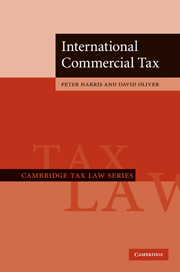Book contents
- Frontmatter
- Contents
- Preface
- List of abbreviations
- Table of Cases
- Table of statutes
- Table of treaties
- Introduction
- 1 Fundamentals and sources of international tax law
- 2 The jurisdiction to tax
- 3 Source country taxation
- 4 Residence country taxation
- 5 The limited scope of treaties
- 6 Changes of source and residence
- 7 Bilateral administrative issues
- Conclusion
- References
- Index
6 - Changes of source and residence
Published online by Cambridge University Press: 03 May 2011
- Frontmatter
- Contents
- Preface
- List of abbreviations
- Table of Cases
- Table of statutes
- Table of treaties
- Introduction
- 1 Fundamentals and sources of international tax law
- 2 The jurisdiction to tax
- 3 Source country taxation
- 4 Residence country taxation
- 5 The limited scope of treaties
- 6 Changes of source and residence
- 7 Bilateral administrative issues
- Conclusion
- References
- Index
Summary
Previous chapters have largely presumed a scenario of an existing and continuing cross-border investment or income flow. In that context, Chapter 2 considered the competing jurisdictions to tax of source and residence countries. The purpose of this chapter is to consider the tax consequences of creating, transferring, terminating or varying those jurisdictions. As a result, this chapter is largely concerned with the effect on the tax attributes of a taxpayer of a change in jurisdiction. Tax attributes are features of a tax system attributable to a taxpayer that are carried forward to future periods. The most common example of a tax attribute is the tax value of assets. The value of an asset for tax purposes in one period may have an impact on the taxability of the holder of the asset in future periods, e.g. where the asset is sold or otherwise disposed of. The same can be true of liabilities. There are other types of tax attributes, such as the carry forward of losses and tax credits.
One matter that is not considered a tax attribute is human capital. While humans are clearly assets in that they have the capacity to produce income, as do other assets, humans are not recognised as assets for tax purposes and have no tax value. So, while many countries complain of ‘brain drain’ when residents with earning capacity leave their jurisdiction, no country seeks to tax exiting individuals on the basis of their potential earnings (or give humans a tax value when they arrive in a jurisdiction).
- Type
- Chapter
- Information
- International Commercial Tax , pp. 416 - 451Publisher: Cambridge University PressPrint publication year: 2010
- 1
- Cited by

